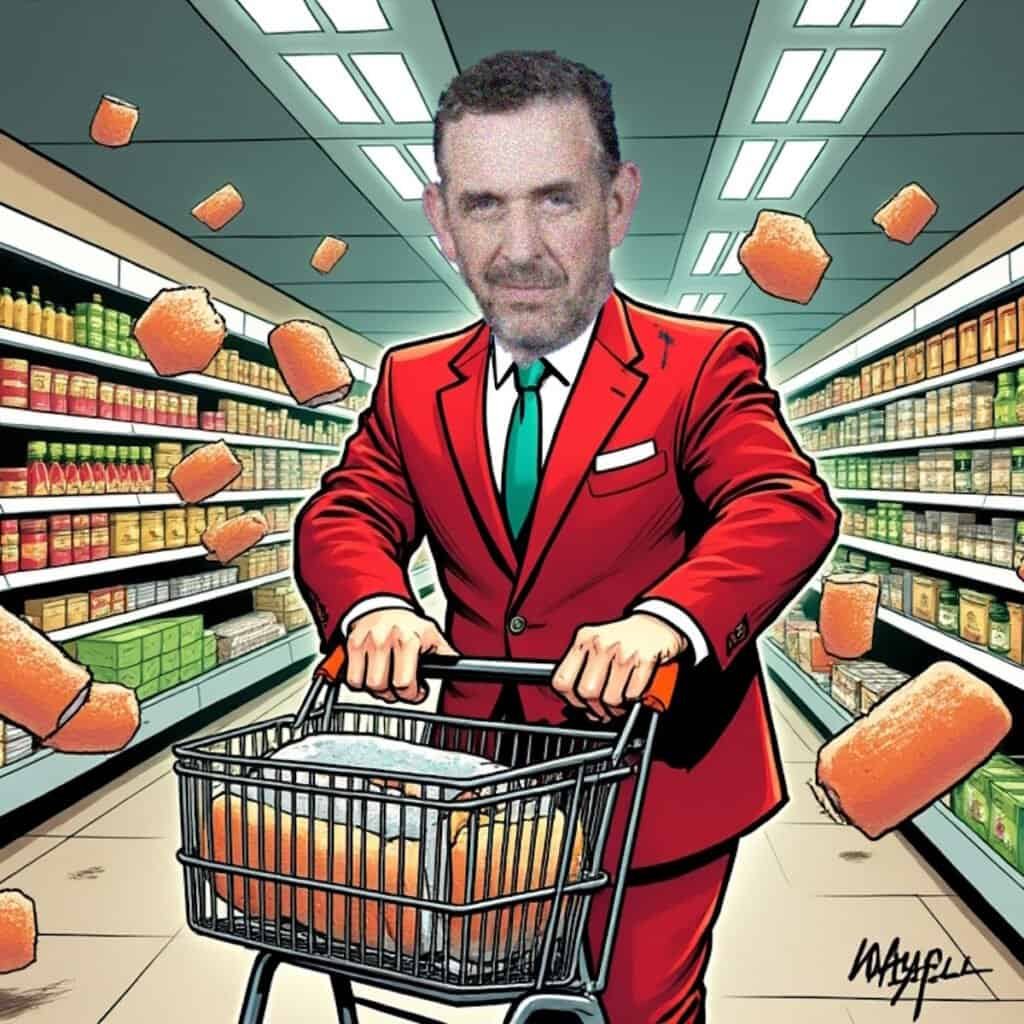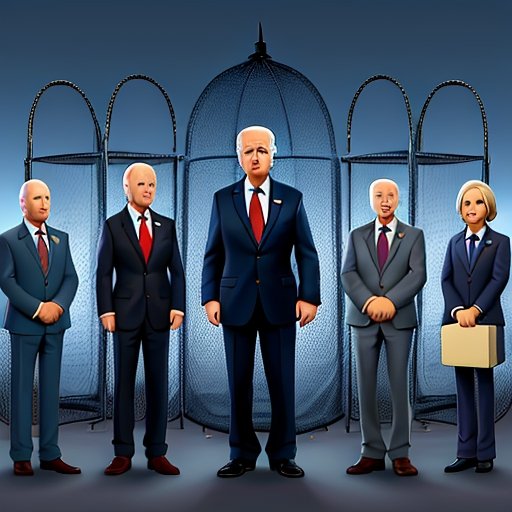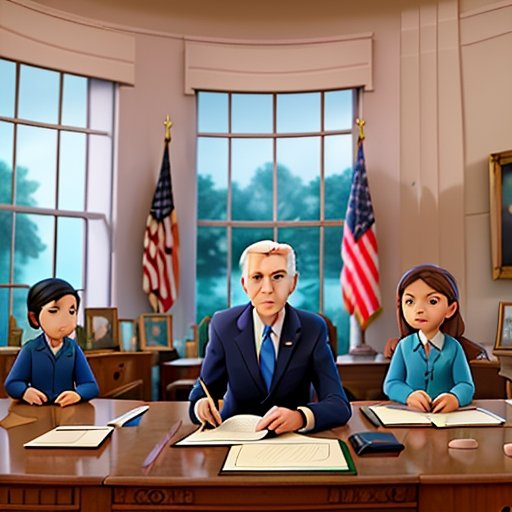OHIO – Rep. Michael Rulli, a first-term House Republican from Ohio who runs a family-owned grocery chain, recently took aim at Vice President Kamala Harris’s proposal for grocery price controls. Rulli, who knows a thing or two about keeping the shelves stocked and the lights on, warned that Harris’s plan could be the kiss of death for family-owned businesses like his. With the savvy of a man who’s counted more pennies than a coin collector, Rulli pointed out that grocery stores typically scrape by on a razor-thin 1.5% to 1.75% profit margin. That’s right, folks – for every $100 you spend on your weekly shop, the store owner is lucky to pocket a measly $1.50. And let’s face it, recent years have been about as kind to the grocery industry as a vegan at a barbecue competition.
Rulli, who won a special election in June to replace retired Rep. Bill Johnson, brings a fresh perspective to Washington – one that smells faintly of produce and common sense. Before joining the political fray, he served as a Republican state senator while simultaneously helping to run Rulli Bros., the grocery chain his father started back in 1917. Now, that’s what we call multi-tasking!
The Price Control Folly: A Recipe for Disaster
To illustrate the potential disaster of Harris’s plan, Rulli used a bottle of Tide laundry detergent as an example. If the Harris administration starts playing price police, manufacturers like Procter & Gamble might just take their ball and go home, leaving consumers with about as much choice as a prisoner’s lunch menu. Rulli’s stores carry a whopping 38,000 different products, while bigger chains stock even more. Under price controls, that variety could shrink faster than a wool sweater in a hot dryer.
The Price Control Ripple Effect
- 😱 Manufacturers may stop producing certain items
- 😕 Reduced product variety for consumers
- 😞 Small businesses struggle to survive
- 🏦 Potential store closures
- 💸 Job losses in the retail sector
Rulli didn’t pull any punches when he compared the potential outcomes of Harris’s plan to the economic conditions in Cuba or Venezuela. Talk about a grocery store horror story! It’s like Harris is trying to turn the land of plenty into the land of “plenty empty shelves.”
Harris’s Plan: Robin Hood or Economic Hood-winker?
Harris’s grand scheme, part of her presidential platform for the upcoming November election, claims to be all about banning food price gouging and tackling those big, bad corporations making “excessive” profits. But let’s be real – this plan has about as much chance of success as a chocolate teapot.
Critics argue that this plan would put the brakes on economic growth faster than a lead foot on the pedal of a rusty old Pinto. It’s the kind of policy that would make even the most hardened socialists blush. Harris’s supporters, bless their hearts, point to profit increases at large food companies between 2019 and 2023. They’re practically salivating over Hershey’s 62% profit jump and the 48% growth at General Mills and Kraft Heinz.
But here’s the kicker – while the big boys might be raking it in, the little guys are struggling to keep the lights on. It’s like Harris is aiming for Goliath but accidentally taking out David instead.
The Grocery Reality: Thin Margins and Big Headaches
Groups like the National Grocers Association are calling Harris’s plan about as necessary as a screen door on a submarine. They’re pointing out what any small business owner could tell you – independent grocers are already operating on margins thinner than dollar store toilet paper, all while wrestling with inflation that’s more persistent than a telemarketer at dinnertime.
Rulli, our grocery guru turned lawmaker, dropped another sobering fact: small and mid-sized grocery stores are closing up shop faster than you can say “cleanup on aisle five.” In the past two years alone, five stores within an 80-mile radius of his location have shut their doors for good. It’s enough to make you wonder if Harris has ever actually set foot in a grocery store, or if she thinks milk and eggs just materialize in the fridge by magic.
The Grocery Store Struggle
| Challenge | Impact |
|---|---|
| Thin Profit Margins | Struggle to cover operational costs |
| Inflation | Increased cost of goods and labor |
| Competition | Pressure to keep prices low |
| Regulations | Additional compliance costs |
Harris’s Silence: The Sound of Economic Ignorance
As of the time of reporting, the Harris campaign was as quiet as a mouse in a library about these concerns. Their silence speaks volumes, doesn’t it? It’s almost as if they’re hoping this half-baked idea will rise like a perfectly proofed loaf of bread, when in reality, it’s more likely to fall flat like a cake in a slammed oven.
This whole debacle is reminiscent of other Democrat-led economic disasters. Remember when Jimmy Carter’s price controls in the 1970s led to gas shortages and mile-long lines at the pump? Or how about Venezuela’s socialist paradise, where people are more likely to find empty shelves than bread? It seems Harris is taking a page out of the “How to Wreck an Economy” playbook, and she’s reading it cover to cover.
Meanwhile, Republican-led states are showing how it’s done. Take Florida under Governor Ron DeSantis, for example. With low taxes, minimal regulations, and a focus on small business support, Florida’s economy is booming like a fireworks show on the Fourth of July. It’s almost as if letting the free market do its thing works better than government meddling. Who knew?
In conclusion, Rulli’s takedown of Harris’s price control plan is a wake-up call louder than your alarm clock on a Monday morning. It’s a reminder that sometimes, the best thing government can do is step back and let businesses do what they do best – serve their customers and communities. As for Harris, perhaps she should stick to what she does best… whatever that may be. The grocery business clearly isn’t her forte.






